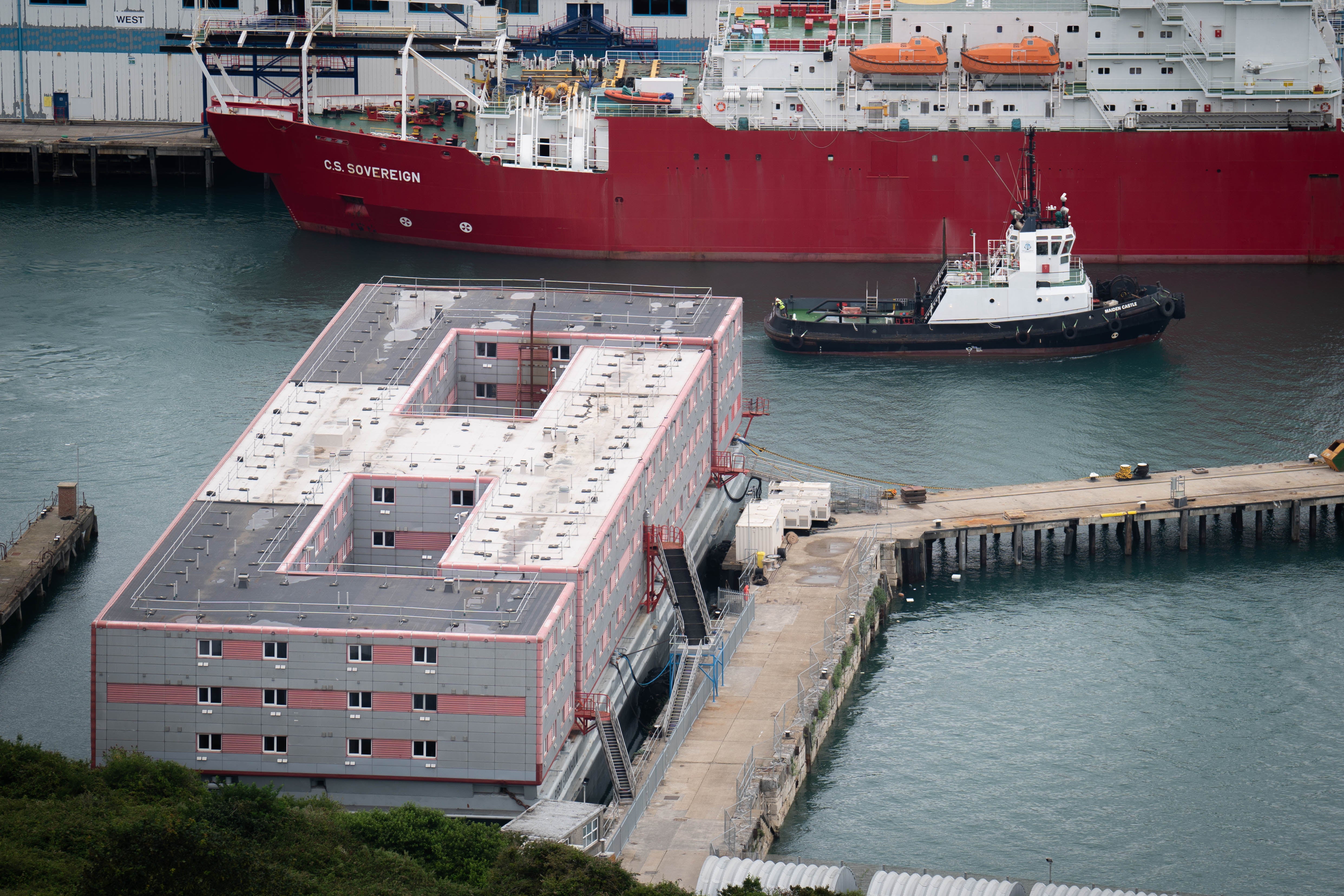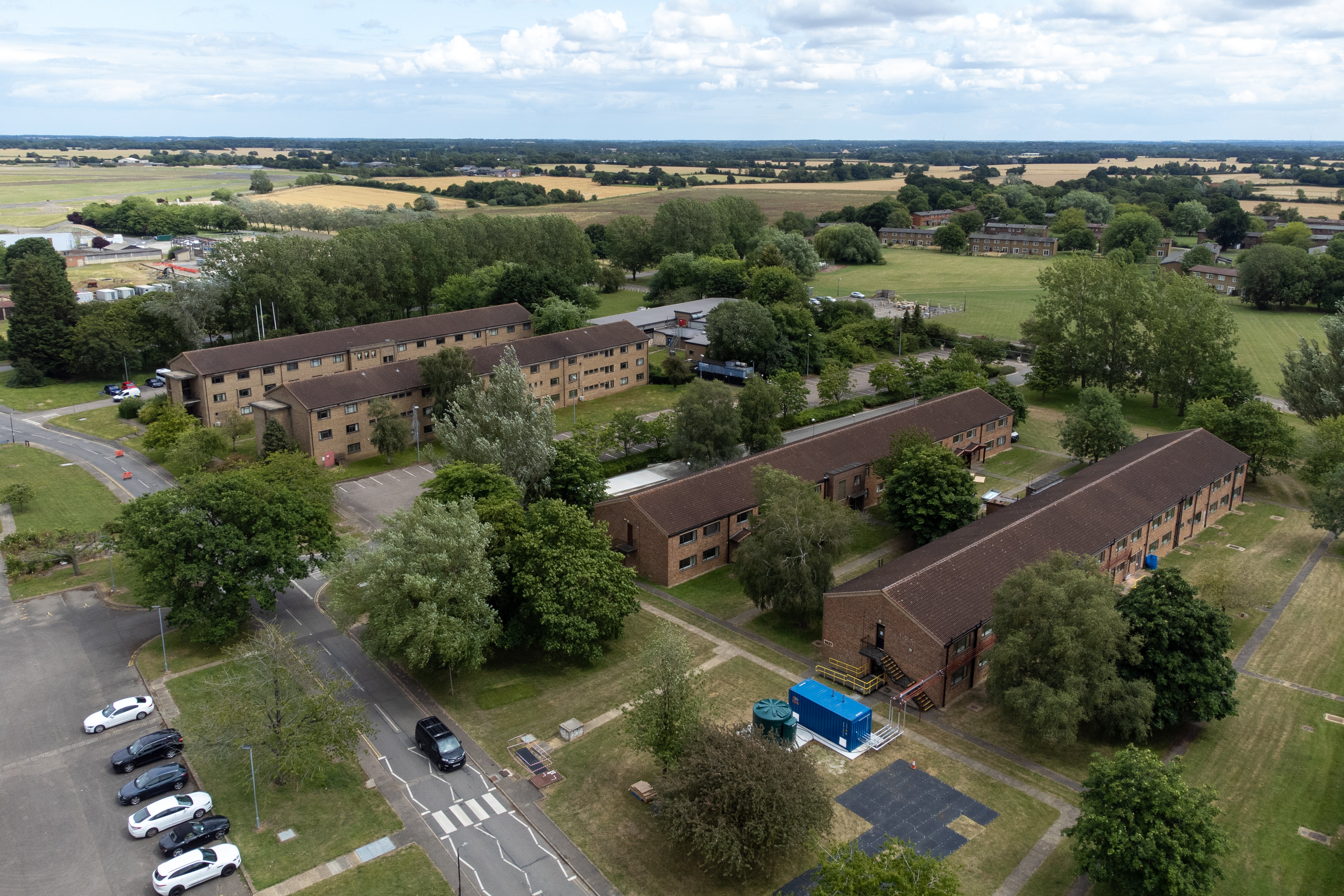Asylum chaos as RAF sites and Bibby Stockholm barge to cost more than hotels
Rishi Sunak’s plan will cost £46m more than the current system, which sees migrants put up in hotels while their claims are being processed – despite the Home Office initially saying it would save taxpayers £94m
Your support helps us to tell the story
This election is still a dead heat, according to most polls. In a fight with such wafer-thin margins, we need reporters on the ground talking to the people Trump and Harris are courting. Your support allows us to keep sending journalists to the story.
The Independent is trusted by 27 million Americans from across the entire political spectrum every month. Unlike many other quality news outlets, we choose not to lock you out of our reporting and analysis with paywalls. But quality journalism must still be paid for.
Help us keep bring these critical stories to light. Your support makes all the difference.
The spiralling costs of Rishi Sunak’s controversial plans to house asylum seekers on RAF sites and in a “prison-like” barge have been laid bare in a damning report that found that the scheme will be significantly more expensive than paying for hotels – despite the sites housing far fewer migrants than planned.
The Home Office initially said that developing the four sites – including the Bibby Stockholm barge, two RAF sites, and former student accommodation in Huddersfield – would save taxpayers £94m.
But Whitehall’s official watchdog says the prime minister’s plan is expected to cost £46m more than the current system – which sees migrants put up in hotels while their claims are being processed – and £1.2bn overall over the next decade.
The National Audit Office (NAO) said the Home Office will have spent at least £230m developing the four major projects by the end of March – despite just two of the sites being open and providing accommodation for only 900 people.
The damning report, published on Wednesday, follows a warning last week from former home secretary Dame Priti Patel that the government’s asylum accommodation system is in need of reform and that there are “serious questions” to be asked of her former department.

The review said the government had spent more money unnecessarily and increased risk by pushing the projects forward too quickly, adding that the Home Office had pursued the policy despite “repeated” assessments that it “could not be delivered as planned”.
Labour said the NAO’s findings were “staggering”, accusing the prime minister of “taking the Tories’ chaos and failure in the asylum system to a new level”.
Shadow home secretary Yvette Cooper added: “On top of the £8m a day on hotel rooms, the government is now paying tens of millions of pounds in set-up costs for new sites in Wethersfield and Scampton, which are still not in use, and millions more for sites that will never be used.”
Charities said the report exposed “bad policies being implemented badly at huge financial cost”, and claimed that the accommodation sites were creating additional “fear and trauma” for asylum seekers.
NAO boss Gareth Davies said: “The pace at which the government pursued its plans led to increased risks, and it now expects large sites to cost more than using hotel accommodation.”
According to the findings, the Home Office originally estimated that the set-up costs at the former RAF bases would be £5m each, but they increased to £49m for Wethersfield and £27m for Scampton.
So far only Wethersfield – which has a capacity of 1,700 – and the Bibby Stockholm, which has space for around 500 men, are housing asylum seekers.
But the two sites were housing just under half the number of migrants the Home Office expected them to accommodate at the end of January, with 576 living at Wethersfield and 321 on the Bibby Stockholm at that point.

The government is currently facing legal action over the conditions at Wethersfield, which has been condemned as a de facto detention centre and not suitable for long-term accommodation.
The Independent has previously revealed that nearly 100 asylum seekers, including suspected victims of torture and human trafficking, were moved out of the RAF base after the Home Office admitted the accommodation was unsuitable for them.
According to the NAO report, the Home Office is “now considering reducing the maximum number of people it accommodates” at Wethersfield, but has not confirmed the new number.
The department expects Scampton to start housing asylum seekers from April, with Huddersfield following in May, it added.
The NAO also found that:
- The Home Office rated its own performance as “red” as it recognised the challenges of the work, repeatedly revising accommodation targets “downwards”
- The department “prioritised awarding contracts quickly, and modifying existing contracts over fully competitive tenders”, with “overly ambitious accommodation timetables” leading to “increased procurement risks”
- Emergency planning rules were used so that sites could be found, and so that work could begin quickly before speaking to affected communities about the plans, in order to “reduce the risk of local opposition affecting negotiations”. In January, the Home Office was “still working with providers to develop specific measures assessing residents’ safety at large sites”
- The Home Office is “resetting” its programme and developing a “longer-term accommodation strategy”, which will see it reduce the number of spaces it intends to provide at such sites amid proposals to “identify smaller sites accommodating between 200-700 people”
- There are “uncertainties” about how the Illegal Migration Act is being implemented, making it harder for the Home Office to assess what asylum accommodation it needs. The report said the law changes will make it “more difficult to assess how much and what type of accommodation the Home Office will need” as it does not know how effective the deterrent will be or how it will affect the amount and type of accommodation required
The costs for Wethersfield, the Bibby Stockholm and Scampton are £777.2m for 2023-2027. Costs for a new site at Huddersfield are £358.4m for the period until 2033 – taking the total costs in the next decade up to £1.2bn.
On Monday, it emerged that Home Office minister Tom Pursglove had confirmed in a letter to Gainsborough Conservative MP Sir Edward Leigh that the “regular occupancy” at RAF Scampton would be a maximum of 800 asylum seekers instead of the original 2,000 men destined for the site, which has been beset by legal challenges.
Ms Cooper said: “This report is staggering. The British taxpayer is already paying out eye-watering sums on asylum hotels, and now it turns out the sites they promised would save money are costing the taxpayer even more. Rishi Sunak has taken the Tories’ chaos and failure in the asylum system to a new level.”

Refugee Council chief executive Enver Solomon said: “There would be no need to spend exorbitant sums of money on housing people in barges, military bases or hotels if cases were dealt with in a timely manner.”
A Home Office spokesperson said that the use of asylum hotels is “unacceptable”, adding that the department had acted to “reduce the impact on local communities by moving asylum seekers onto barges and former military sites”.
They added: “The cost of hotels will fall – and we are now closing dozens of asylum hotels every month to return them to communities ... While the NAO’s figures include set-up costs, it is currently better value for money for the taxpayer to continue with these sites than to use hotels.”
Subscribe to Independent Premium to bookmark this article
Want to bookmark your favourite articles and stories to read or reference later? Start your Independent Premium subscription today.

Join our commenting forum
Join thought-provoking conversations, follow other Independent readers and see their replies
Comments